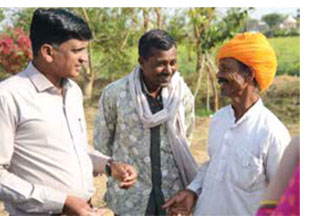Society. We Care.
Respecting Human Rights GRI 406-412
Our human rights policy is specified in Ambuja Cement Limited’s Code of Conduct and Business Ethics. We also follow the LafargeHolcim Group’s Directive on Human Rights. We prohibit the following practices and will not knowingly do business with any individual or company that participates in: exploitation of children including child labour; physical punishment; genderbased violence; forced or compulsory labour; unlawful discrimination in employment and hiring practices; provision of unsafe working conditions; salary payments (or deductions) below minimum wage; and illegal overtime regulations. Our commitment to human rights is reinforced by our Group’s participation in the UN Global Compact (UNGC), support of the Universal Declaration of Human Rights and our CSR Policy. Ambuja Cements Limited is an active life member of The Global Compact Network India (GCNI), the Indian arm of the UNGC. Our Group has developed a Human Rights Management System (HRMS) that is mandatory for all our stakeholders. The system examines our own behaviour as well as the value chain, in particular the supply side and third party service contractors. Any incidence of failure to comply with the rules, or other concerns can be shared with our local human resources representative. HRMS is based on country-wise human rights risk assessment and classification and is carried out using Freedom House (an international NGO) and UN human development indices. Issues within a specific country are taken into account; India has been classified as high risk in the context of human rights. Belonging to a high risk country, Ambuja Cements Limited is expected to conduct full-fledged human rights assessments. We undertake a Site Specific Impact Assessment (SSIA) at each of our sites every three years, capturing the perceptions of all our stakeholders and addressing potential risks. Representatives of all our stakeholders interact with the assessment team through focus group discussions. The final report rates our performance on the basis of health and safety; security excesses; grievance mechanisms; community impact; ethics; land management and adherence to ILO core conventions. At the end of the assessment, an action plan is prepared in consultation with the unit head and the senior team to mitigate the identified risks. Implementation of the approach is monitored through the annual CSR Questionnaire. The first round of SSIA began in 2012 and was completed for all 13 manufacturing locations in 2015. The second cycle started in 2016. The action plan for each site is being implemented.
 We place strong emphasis on the rights of women;
preventing child labour or any other forms of forced
labour; and non-discrimination across our operations and supply chain. We have systems to ensure that the
labour engaged by our contractors is covered by the
Contract Labour (R&A) Act along with mechanisms
to report any violations. The responsibility for
implementing the Group’s human rights approach
rests with the CSR or SD Coordinator along with line
and functional management.
We place strong emphasis on the rights of women;
preventing child labour or any other forms of forced
labour; and non-discrimination across our operations and supply chain. We have systems to ensure that the
labour engaged by our contractors is covered by the
Contract Labour (R&A) Act along with mechanisms
to report any violations. The responsibility for
implementing the Group’s human rights approach
rests with the CSR or SD Coordinator along with line
and functional management.
The Company has a Supplier Code of Conduct (SCC) that covers various human rights aspects; all our suppliers are required to complete the Supplier CSR and OH&S Management System Questionnaires as a condition for eligibility. The self-declaration covers employee safety, occupational health, corporate social responsibility and environment management. All procurement agreements of the Company include conditions pertaining to labour standards and occupational health and safety.
Currently, significant investment agreements do not include human rights clauses. Although Ambuja Cement does not monitor training hours or the number of employees trained in human rights, our employees are trained and sensitised about human rights through initiatives on sustainable procurement, CSR and labour practices. We plan to roll out a Company-wide e-learning module on human rights in 2017.
Ambuja Cements Limited encourages collective bargaining for harmonious industrial relations. Discussions are periodically held and issues resolved with employees’ representatives. They are also inducted into various committees constituted for their welfare. No instances or suppliers were reported where violation of employee rights of association or collective bargaining were observed, nor were there any reports of instances of suppliers indulging in child labour, forced or compulsory labour. Although the Company does not monitor training hours of security personnel, they are sensitised about human rights through initiatives on labour practices
The total number of incidents, complaints or grievances of human rights violations along with the backlog of earlier incidents is zero. No complaints were received, nor are any pending of child labour, forced/involuntary labour, sexual harassment and discriminatory employment. Ambuja Cement promotes equality and diversity and there were no incidents of discrimination in the reporting period.